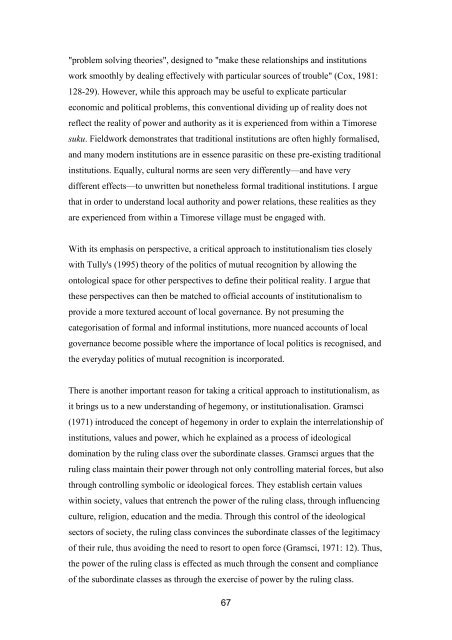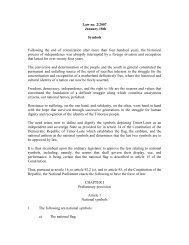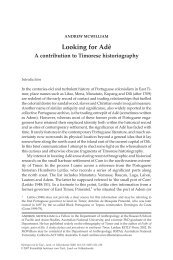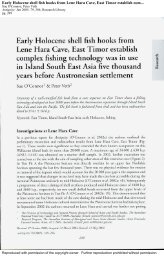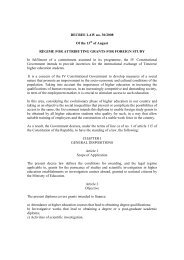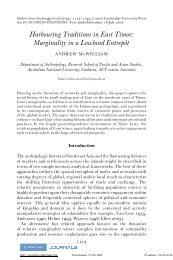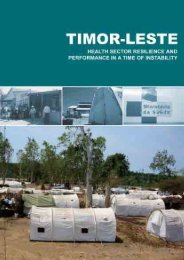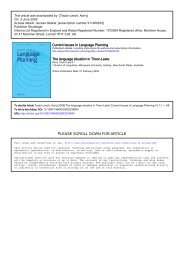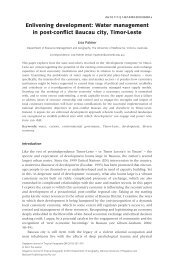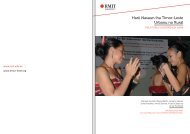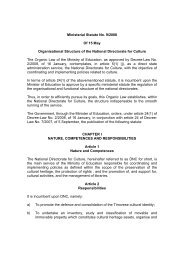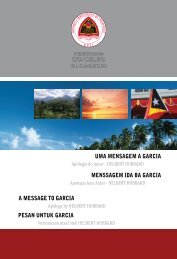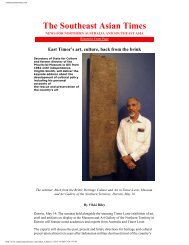Local Governance in Timor-Leste - Secretaria de Estado da Arte e ...
Local Governance in Timor-Leste - Secretaria de Estado da Arte e ...
Local Governance in Timor-Leste - Secretaria de Estado da Arte e ...
- No tags were found...
You also want an ePaper? Increase the reach of your titles
YUMPU automatically turns print PDFs into web optimized ePapers that Google loves.
"problem solv<strong>in</strong>g theories", <strong>de</strong>signed to "make these relationships and <strong>in</strong>stitutionswork smoothly by <strong>de</strong>al<strong>in</strong>g effectively with particular sources of trouble" (Cox, 1981:128-29). However, while this approach may be useful to explicate particulareconomic and political problems, this conventional divid<strong>in</strong>g up of reality does notreflect the reality of power and authority as it is experienced from with<strong>in</strong> a <strong>Timor</strong>esesuku. Fieldwork <strong>de</strong>monstrates that traditional <strong>in</strong>stitutions are often highly formalised,and many mo<strong>de</strong>rn <strong>in</strong>stitutions are <strong>in</strong> essence parasitic on these pre-exist<strong>in</strong>g traditional<strong>in</strong>stitutions. Equally, cultural norms are seen very differently—and have verydifferent effects—to unwritten but nonetheless formal traditional <strong>in</strong>stitutions. I arguethat <strong>in</strong> or<strong>de</strong>r to un<strong>de</strong>rstand local authority and power relations, these realities as theyare experienced from with<strong>in</strong> a <strong>Timor</strong>ese village must be engaged with.With its emphasis on perspective, a critical approach to <strong>in</strong>stitutionalism ties closelywith Tully's (1995) theory of the politics of mutual recognition by allow<strong>in</strong>g theontological space for other perspectives to <strong>de</strong>f<strong>in</strong>e their political reality. I argue thatthese perspectives can then be matched to official accounts of <strong>in</strong>stitutionalism toprovi<strong>de</strong> a more textured account of local governance. By not presum<strong>in</strong>g thecategorisation of formal and <strong>in</strong>formal <strong>in</strong>stitutions, more nuanced accounts of localgovernance become possible where the importance of local politics is recognised, andthe every<strong>da</strong>y politics of mutual recognition is <strong>in</strong>corporated.There is another important reason for tak<strong>in</strong>g a critical approach to <strong>in</strong>stitutionalism, asit br<strong>in</strong>gs us to a new un<strong>de</strong>rstand<strong>in</strong>g of hegemony, or <strong>in</strong>stitutionalisation. Gramsci(1971) <strong>in</strong>troduced the concept of hegemony <strong>in</strong> or<strong>de</strong>r to expla<strong>in</strong> the <strong>in</strong>terrelationship of<strong>in</strong>stitutions, values and power, which he expla<strong>in</strong>ed as a process of i<strong>de</strong>ologicaldom<strong>in</strong>ation by the rul<strong>in</strong>g class over the subord<strong>in</strong>ate classes. Gramsci argues that therul<strong>in</strong>g class ma<strong>in</strong>ta<strong>in</strong> their power through not only controll<strong>in</strong>g material forces, but alsothrough controll<strong>in</strong>g symbolic or i<strong>de</strong>ological forces. They establish certa<strong>in</strong> valueswith<strong>in</strong> society, values that entrench the power of the rul<strong>in</strong>g class, through <strong>in</strong>fluenc<strong>in</strong>gculture, religion, education and the media. Through this control of the i<strong>de</strong>ologicalsectors of society, the rul<strong>in</strong>g class conv<strong>in</strong>ces the subord<strong>in</strong>ate classes of the legitimacyof their rule, thus avoid<strong>in</strong>g the need to resort to open force (Gramsci, 1971: 12). Thus,the power of the rul<strong>in</strong>g class is effected as much through the consent and complianceof the subord<strong>in</strong>ate classes as through the exercise of power by the rul<strong>in</strong>g class.67


